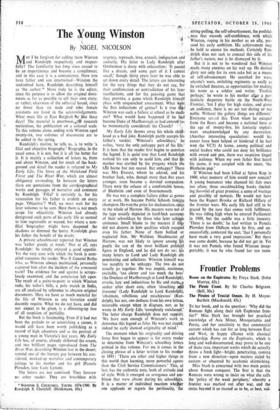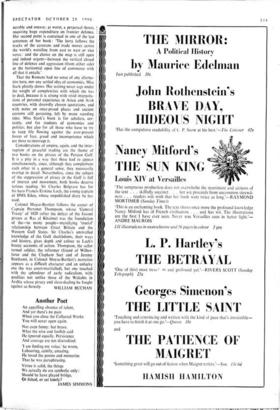Frontier Problems The Pirate Coast. By Sir Charles Belgrave. (Bell,
30s.) The Pirates of Trucial Oman. By H. Moyse- Bartlett. (Macdonald, 45s.) To her book, and to the question: 'Why did the Romans fight along their rich Euphrates fron- tier?' Miss Stark has brought her practical knowledge of Asia Minor, Mesopotamia and Persia, and her sensitivity to that commercial current which has run for so long between East and West, in happy alliance with classical scholarship. Rome on the Euphrates, which is long and well-documented, may prove to be one of thcite rare, important works which do actually throw a fresh light—bright, penetrating, coming from a new direction—upon matters staled by custom or obscured by academic skirmishing.
Miss Stark is concerned with two main points about Roman conquest. The first is that the Romans were wrong to insist on what she calls the 'policy of the weak periphery,' whereby a frontier was marked out after war, and the states beyond it so treated as to be, at best, vul-
nerable and uneasy; at worst, a perpetual threat, requiring huge expenditure on frontier defence. Her second point is contained in one of the last sentences of her book : 'The lorry follows the tracks of the caravans and trade moves across the world's waistline from east to west or vice versa: and the choice on the map is still open and indeed urgent—between the vertical closed line of defence and aggression (from either side) or the horizontal open line of commerce with all that it entails.'
That the Romans had no sense of any alterna- tive here, nor any settled idea of economics, Miss Stark plainly shows. Her writing never sags under the weight of complexities with which she has to deal, because it is strung with vivid interpola- tions of personal experience in Asian and Arab countries, with shrewdly chosen quotations, and with notes on once-proud places and ancient customs still persisting, left by many receding tides. Miss Stark's book is for scholars, cer- tainly. and for students of economics and politics; but also for all those who have to try to keep life flowing against the ever-present forces of fear, greed and incompetence which are there to interrupt it.
Considerations of empire, again, and the inter- ruption of peaceful trading are the theme of two books on the pirates of the Persian Gulf. It is a pity in a way that these had to appear simultaneously, since, although they complement each other in a general sense, they necessarily overlap in detail. Nevertheless, since the subject of the suppression of piracy in the Gulf is full of interest and movement, both books deserve serious reading. Sir Charles Belgrave has for his hero Francis Erskine Loch, the young captain of HMS Eden, whose unpublished diary he has used.
Colonel Moyse-Bartlett follows the career of Captain Perronet Thompson, whose 'General Treaty' of 1820 (after the defeat of the Joasmi pirates at Ras al Khaima) was the foundation of the—to many people—mystifying `truciar relationship between Great Britain and the Western Gulf States. Sir Charles's unrivalled knowledge of the Gulf sheikhdoms, their ways and history, gives depth and colour to Loch's breezy accounts of action. Thompson, the sailor turned soldier, the reformer (friend of Wilber- force and the Clapham Sect and of Jeremy Bentham), in Colonel Moyse-Bartlett's narrative appears as a difficult character and an unlucky one (he was court-martialled), but one touched with the splendour of early radicalism, with qualities not unlike those of the Wahabis in Arabia whose piracy and slave-dealing he fought







































 Previous page
Previous page